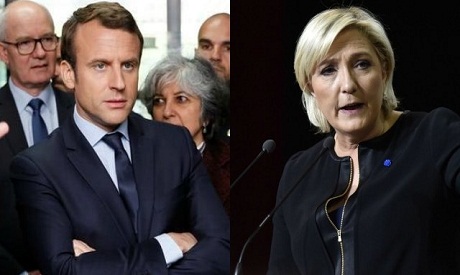
Emmanuel Macron and Marine Le Pen (Photo: Reuters/AFP)
Voters across France were choosing a new president Sunday in an unusually tense and important election that could decide Europe's future, making a stark choice between pro-business independent Emmanuel Macron and far-right populist Marine Le Pen.
With Macron the pollsters' favorite, voting stations opened across mainland France at 8 a.m. (0600 GMT) under the watch of 50,000 security forces guarding against extremist attacks. Polling agency projections and initial official results are expected as soon as the final stations close at 8 p.m. (1800 GMT.)
The most closely watched and unpredictable French presidential campaign in recent memory ended with a hacking attack and document leak targeting Macron on Friday night. France's government cybersecurity agency, ANSSI, is investigating the hack, which Macron's team says was aimed at destabilizing the vote.
The fate of the European Union may hang in the balance as France's 47 million voters decide whether to risk handing the presidency to Le Pen, who dreams of quitting the bloc and its common currency, or to play it safer with Macron, an unabashed pro-European who wants to strengthen the EU.
Global financial markets and France's neighbors are watching carefully. A "Frexit" would be far more devastating than Britain's departure, since France is the second-biggest economy to use the euro. The country also is a central pillar of the EU and its mission of keeping post-war peace via trade and open borders.
The vote will help gauge the strength of global populism after the victories last year of a referendum to take Britain out of the EU and Donald Trump's U.S. presidential campaign. In France, it is a test of whether voters are ready to overlook the racist and anti-Semitic past of Le Pen's National Front party.
Le Pen has broadened the party's appeal by tapping into — and fueling — anger at globalization and fears associated with immigration and Islamic extremism. Macron has argued that France must rethink its labor laws to better compete globally and appealed for unity and tolerance that Le Pen called naive.
Either candidate would lead France into uncharted territory, since neither comes from the mainstream parties that dominate parliament and have run the country for decades. The winner will have to try to build a parliamentary majority in elections next month to make major changes.
Voting began Saturday in overseas territories, from Saint-Pierre-et-Miquelon, an archipelago near Newfoundland, to French Guiana and the French West Indies and beyond. French citizens also turned out in droves to vote in the Canadian province of Quebec.
Fears of outside meddling hung over the race after France's election campaign commission said Saturday that "a significant amount of data" — and some fake information — was leaked on social networks following the hacking attack on Macron.
The leaked documents appeared largely mundane, and the perpetrators remain unknown. It's unclear whether the document dump will dent the large polling lead Macron held over Le Pen going into the vote.
The commission urged French media and citizens not to relay the leaked documents. French electoral laws impose a weekend news blackout on any campaigning and media coverage seen as swaying the election. Le Pen's campaign could not formally respond due to the blackout.
The Macron team asked the campaign oversight commission to bring in cybersecurity agency ANSSI to study the hack, according to a government official who spoke to The Associated Press on condition of anonymity because they weren't authorized to discuss the details publicly.
ANSSI can only be called in to investigate cyberattacks that are "massive and sophisticated" — and the Macron hack appears to fit the bill, the official said.
The documents leaked Friday were widely circulated on far-right sites based in the United States. Experts dissecting the data said they spotted a couple of Russian names in the dump.
From depressed northern France to the streets of Paris, some voters were just looking forward to the end of the vitriolic campaign.
In Henin-Beaumont in northern France, where Le Pen will cast her ballot on Sunday, 28-year-old Thomas Delannoy said the campaign "looks like reality TV." The construction painter called the electoral process "laughable," saying that neither candidate had a platform with which he could identify.
Many voters expressed similar frustration, and a big question remaining Sunday was how many of them would bother to vote. Unions already plan a protest Monday regardless of whether Le Pen or Macron wins.
Short link: